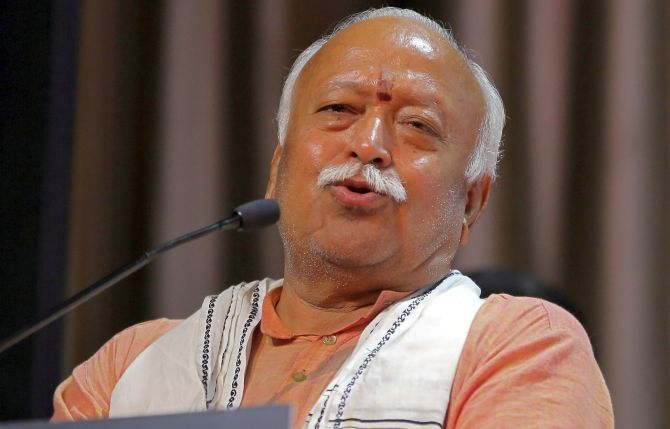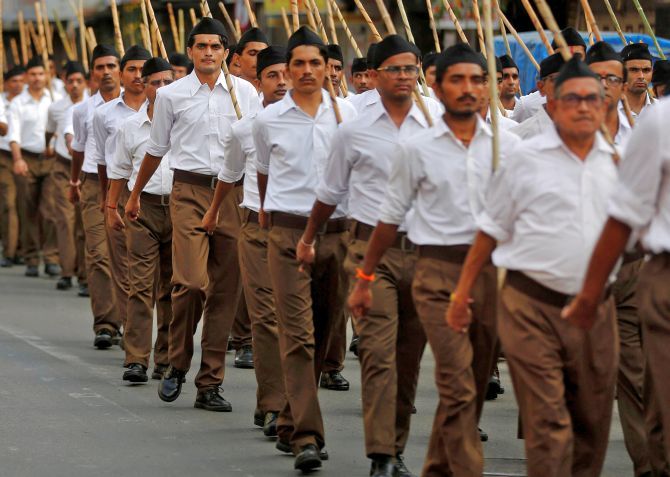'In its history, the RSS has never seen success as it is seeing now. And it wants to extend its base.'

Rashtriya Swayamsevak Sangh Mohan Bhagwat startled political observers with his remarks at a three-day event thsi week, 'Future of Bharat: An Indian Perspective', in New Delhi.
On Monday, September 17, he said, 'Our vision of Hindutva is not to oppose or demean anyone.'
At the conclave on Tuesday, September 18, Bhagwat said, Hindu rashtra doesn't mean there is no place for Muslims. The day it is said so, it won't be Hindutva any more.'
On Wednesday, September 19, referring to cow vigilantism, Bhagwat said, 'It is a crime to take the law into one's own hands.'
Rediff.com's Syed Firdaus Ashraf spoke to Badri Narayan, social historian, cultural anthropologist and professor at the Gobind Ballabh Pant Social Science Institute, Allahabad, on how the RSS is repositioning itself as an inclusive organisation.
"Today the RSS is concentrating more on social inclusion and uniting people," says Professor Narayan, author of Fascinating Hindutva: Saffron Politics and Dalit Mobilisation.
How do you view Mohan Bhagwat's statement about the RSS being inclusive and welcoming people from all communities
The RSS is changing as an organisation and are now trying to become flexible. It is trying to assimilate various groups and identities into one. It is working in that direction and the statement made by Bhagwat is a reflection of that.
Why do you think the RSS needs to change?
In its history, the RSS has never seen success as it is seeing now. And it wants to extend its base.
Why did it take the RSS so long to become so influential?
They spread in phases. First, the RSS spread on the basis of 'versus' (Hindu versus Muslim). That phase went on for a very long time. It held a particular group and became strong. That phase is over now and they have saturated.
Now it wants to include other groups too.
So, the question arises whether their earlier Hindu samaj will be upset. I don't think that will happen because the Hindu samaj itself gives importance to inclusive ideas.
I feel the RSS will not have any disturbance in their base community when it tries to bring in other communities into their organisation.
This is a new strategy of inclusiveness through discussion that the RSS is trying to adopt.
When the RSS talks of Hindutva including Muslims, what is left of Hindutva?
As far as I know, (Vinayak Damodar) Savarkar always excluded Christians and Muslims from his brand of Hindutva as he believed their holy land is not India.
Hindutva has many forms. It has a religious form.
Secondly, there is cultural Hindutva -- like doing puja-paat.
Thirdly, it is on value-based (moolya ke aadhar par) system.
I feel the RSS is trying to include everyone in the Hindutva value-based system. But others (Muslims and Christians) will not do puja of Lord Ram or Lord Krishna, but the values will be followed.
This is what I am interpreting, but the real answer can be given only by Mohan Bhagwatji.
The RSS has a history of spewing venom against Muslims and Christians.
The RSS is changing a lot. It is changing its old fundamentals. There is a huge difference in the RSS of then and now. But if you ask them they will deny this and say that they are the same organisation.
I feel there is a difference in the working of the RSS compared to its earlier avatar.

The Opposition parties do not see this change in the RSS, but view it with suspicion.
They clash with the fundamentals of the RSS. They are still fighting with the old thoughts of the RSS.
Till they do not have an understanding of the new RSS, how can they criticise them? By criticising the old RSS, they will not gain anything.
If they want to take on the new RSS politically, then you have to have a better understanding of the activities of the RSS which is working at the grassroots.
M D Deoras was the first sarsanghchalak who included Adivasis and Dalits into the RSS fold. Do you think he was the first person to understand that the RSS needed to change its identity, and was in fact the first agent of change?
It is possible, but I have not followed the old RSS. How the old RSS was changing is a different issue to study.
There was a time when the RSS started praising Indira Gandhi. They did start changing then, but today the RSS is concentrating more on social inclusion and uniting people.
The image one had of the RSS was that it believed in 'the other'.
That is what I told you, it was 'versus'. But now that 'other' has become 'self'. This self is becoming very big in which everyone will assimilate.
In practice how far they will succeed, we will have to see. Right now it is being discussed; how far it will succeed in practice is a different matter.
Will Muslims and Christians accept the RSS?
We cannot say that at this moment. The RSS plays a very long innings. It will work slowly.
No one in the past had thought that the RSS would spread to the north east, but see the place the RSS has been able to carve out there. It helped form a government in Tripura.
The RSS is visionary and slowly it can influence Christians and Muslims, but right now it is not possible. It is a discourse that it has just brought in and as a political analyst I see that it will spread this new inclusive ideology slowly.
So what happens to 'secularism'? Will it collapse in this scenario?
Secular forces will have to work smartly and come out with new ideas.
Secularism will have to take a re-birth to survive and flourish.
The RSS has taken a new birth and secularism too will have to take a new birth, only then will it spread.
Till the time secular forces do not adopt a new language but work with the old language, they will be in trouble.
How did the RSS succeed in spreading the story that secularism meant minority appeasement?
It is very difficult to predict how the RSS works as the way it works is very deep. It gives time and works very patiently. It slowly settled down (in society).
When the RSS now talks of inclusiveness, will it be able to give up the Brahmanical cultural imperialism where it decides what people must eat, etc?
That will take time and that too will change. Take out the word Brahmanical as they have ritual base Hindutva, and that takes them to cultural imperialism.
I think they will have to change and dilute it. If they do not do that, then it will be difficult for them.










